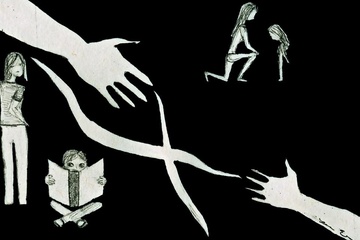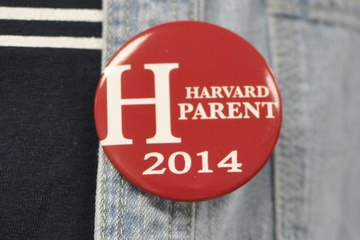There is a house in an imaginary Newark, in a row of red brick buildings between the highway and the sun.
The sky blazes a blue there you haven’t seen before, a blue that doesn’t exist. Laundry hangs from a line. Clematis winds up the stoop. There is a garden where the tomatoes are ripe, where you can dip your fingers in the grass and draw up color, cool and creamy as globs of paint. The fig trees are always in fruit.
“Aunt Lucia has started confabulating,” my mother says. We are sitting in the car on the way to the city. I am heading back to school.
“She fell and hit her head. She is confabulating now.”
I don’t know what the word means. I picture something complex and delicious, round as grapes or the word bamboozle, something that pops in my mouth.
“It’s like talking to a toddler,” my mother says. “She’ll forget the year. She’ll tell you it’s 1950 or that she’s been talking to someone who’s been dead for decades. Then you realize that all that time, you’ve been having a conversation with someone in another place.”
When I was growing up, Aunt Lucia sat dour-faced, sneering, in the corner of family parties, asking me why I was so fat. When I got skinny, Aunt Lucia had to content herself with asking why I wasn’t wearing any stockings. The last time I saw her, I polished Lucia’s silver. She was too deaf and too old then to have much of anything to ask.
She was matte-faced, sweet-smelling, nude-hosed and cruel. In her later years, when I knew her—sitting crunched under pressure of age next to the space heater—she couldn’t hear at all. Never-married, childless, she had been alone for the past thirty years. Before that, before the last of them died, she had lived with her sisters and her brother Alessandro, my great-grandfather, at the top of the old family house in Newark, with a garden out back.
“There were twisted carrots and grapes on the fence,” Lucia told me when I asked. “We’d go picking dandelion greens for salad in the fields that became Newark Airport.” I imagined heavy-faced Italian girls in ripped dresses, leaning in the weeds against a blue sky buzzing with planes. “On Sundays, we’d make tomato sauce.”
It was then I started imagining the house: the garden and the rooms full of dusty furniture. Family members I had never met. When Lucia started confabulating, I knew that was where her mind had gone.
After Lucia falls, we bring her to a nursing home. Lately she’s stopped going to the beauty parlor for her weekly set, stopped freezing jars of milk to make them last. Her curls are white. The people at the nursing home put her to bed in a t-shirt that says “Jersey Gangster” with a dollar sign for the “s.” That’s how my mother finds her when she goes to pick her up for a family party a few weeks later.
She enters my grandmother’s small suburban house with a walker. She enters an imaginary Newark. There are kisses all around. There are screaming children. There is pork roast. Papa plucks a grape from the back fence.
“When’s Alessandro coming?” Lucia asks. Alessandro is Papa, my great-grandfather, Grandma’s father, Aunt Lucia’s brother, the grower of grapes.
My mother explains that he’s dead.
Alessandro sits in an old wooden rocking chair next to a carved dresser covered with dull white sheets.
“He’s coming later,” Aunt Lucia says.
My sister wears a t-shirt that says “Jersey Girl” with a fancy cursive “s.” Lucia approaches her and says, “But wait, wasn’t the girl just—there?” She gestures towards the floor, a space about two feet above it.
“Yes,” my mother says, “but they grow fast.”
“Ah,” she responds, like it’s natural. Like in the course of the day a clematis vine can grow from barely vibrating over the dust to the top of the trellis. It is a natural thing.
My mother is the one who brings her back to the nursing home at the party’s end.
“When will your Papa come?” Aunt Lucia asks.
“Papa’s at home,” my mother says.
Lucia looks at my mother. She is back at the home, stumbling into the small bed. “I will remember this day for the rest of my life,” she tells my mother.
My mother’s voice swells as she tells me this. We both know what little life Lucia has left.
After Aunt Lucia dies, I think of a story that goes like this:
One day, while folding laundry—the smell of fabric softener and the drier’s purr in the warm air—my mother opens the washing machine and remembers suddenly a time when she was a child, something she didn’t understand. When Lucia, normally cantankerous, grasped her hand in her aunts’ tiny parlor—the older hand already going slack—and said, Thank you, Carla, thank you for that, meaning the afternoon of the family party, the one she will remember forever, the one that hadn’t happened yet. There, in her blue house on its big lawn, in her own life, my mother realizes it, and her rough hands pause in their folding. Knowledge is something that goes forwards and backwards, she thinks (and when I think this, I have been reading Marquez); things seep into history; history seeps into us.
It is enough to make me want to believe in heaven. It is enough to disrupt time.
There are roses carved into the wardrobes, peeled white paint on the headboards, flowerbeds, dust. I open the linen closet as I bear a basket full of laundry. I fold a dress into the flower-carved drawer of Papa’s old dresser, the one we still have in our house.
It is mid-afternoon. I imagine walking through the closet into a room full of dusty furniture (my great-grandmother’s dresser, her dining room chairs) and seeing someone—Papa, maybe, whom I know only from photographs—snoring under a cloth.
Didn’t you used to be this tall? he says, starting awake on the rickety wood, pushing the sheet up, taking in lungfuls, gesturing to a space two feet above the ground. A few strands of spider-silk drift gleaming into the back-bending afternoon light from where he has moved the blanket.
We grow quickly, I will answer, opening the door to the garden, letting the distant drone of planes in, gesturing to a trembling slip of clematis winding up the stoop.
Reina A. E. Gattuso ’15 is a joint concentrator in Literature and Studies of Women, Gender, and Sexuality in Adams House. She is a Jer$ey Girl.





